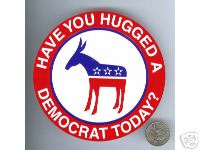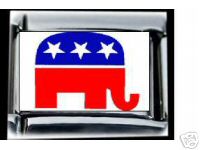The Fair Tax: The Great Equalizer
When Sunnye invited me to post on this blog, I wasn’t sure I was up to her calibre of writing. But decided that all I had to do was speak from my heart about something I am passionate about: The Fair Tax.
I began looking through the 50 Reasons I Support the Fair Tax and decided that #26 is well worth writing about and brings in two of my other passions, Immigration reform and Social Security reform. But, I promise I will stay off my soapbox and not speak to the others except as it applies to the Fair Tax.
There are approximately 290 million Americans. I say approximately because there are births and deaths, people being hired and fired, and people emigrating to and immigrating from all corners of the world every day. Of those approximately 290 million Americans, only about 110 million workers fund government programs such as Social Security and Medicare.
There is something in the vicinity of 51 million tourists who visit the US. While they are visiting our fair country, they spend money. Hotels, car rentals, housing, food, souvenirs, clothing, tickets to theme parks, museums, sporting events, and so on. Pretty much the same things American citizens spend money on everyday. The main difference is that tourists don’t live here and so don’t generally contribute to funding the American government through payroll deductions.
Add to the millions of tourists visiting the US, the tens of thousands of people who live “below” the radar of our current tax code by not having traditional jobs where taxes are taken from their paychecks. The group that you would probably think of first is the criminal element. Burglars, drug dealers, car thieves, muggers, identity thieves, and prostitutes would pay their “fair” share simply by making a purchase at their local Wal-Mart or Circuit City. You don’t suppose that drug dealers file an income tax return do you? And if they do, I’m reasonably sure that they wouldn’t report their full income. By instituting the Fair Tax, every time a drug dealer bought a new car, jewelry, clothing, food, he (or she) would pay as much tax as you, the do.
How about the day laborers who are so often illegal immigrants? They are usually paid in cash, often under the table and no taxes are deducted from their wages. Like the criminals in the previous example, cash-paid day laborers would pay their “fair” share of the tax burden when they purchased food, goods, or services.
Under the Fair Tax, it is the consumer who decides how much tax they will pay. Everyone will pay the same rate. There will be no loopholes or deductions that are available to the wealthier members of society; they will pay the same rate as the couple struggling to get by on minimum wage. If Sam Gotrocks wants to buy a new car, he will be taxed as the same rate as Joe Lunchbox who buys the economy car. If Joe wants to buy a “used” car, he will pay no tax at all. The original owner will have paid the tax for him. Imagine buying a car only a year or so old and not paying taxes on it.
Talk about an equalizer! The Fair Tax is just that! It doesn’t discriminate. The Fair Tax doesn’t care whether you are wealthy or poor, black or white, legal or illegal, working or not. Everyone pays the same tax rate.
I began looking through the 50 Reasons I Support the Fair Tax and decided that #26 is well worth writing about and brings in two of my other passions, Immigration reform and Social Security reform. But, I promise I will stay off my soapbox and not speak to the others except as it applies to the Fair Tax.
There are approximately 290 million Americans. I say approximately because there are births and deaths, people being hired and fired, and people emigrating to and immigrating from all corners of the world every day. Of those approximately 290 million Americans, only about 110 million workers fund government programs such as Social Security and Medicare.
There is something in the vicinity of 51 million tourists who visit the US. While they are visiting our fair country, they spend money. Hotels, car rentals, housing, food, souvenirs, clothing, tickets to theme parks, museums, sporting events, and so on. Pretty much the same things American citizens spend money on everyday. The main difference is that tourists don’t live here and so don’t generally contribute to funding the American government through payroll deductions.
Add to the millions of tourists visiting the US, the tens of thousands of people who live “below” the radar of our current tax code by not having traditional jobs where taxes are taken from their paychecks. The group that you would probably think of first is the criminal element. Burglars, drug dealers, car thieves, muggers, identity thieves, and prostitutes would pay their “fair” share simply by making a purchase at their local Wal-Mart or Circuit City. You don’t suppose that drug dealers file an income tax return do you? And if they do, I’m reasonably sure that they wouldn’t report their full income. By instituting the Fair Tax, every time a drug dealer bought a new car, jewelry, clothing, food, he (or she) would pay as much tax as you, the do.
How about the day laborers who are so often illegal immigrants? They are usually paid in cash, often under the table and no taxes are deducted from their wages. Like the criminals in the previous example, cash-paid day laborers would pay their “fair” share of the tax burden when they purchased food, goods, or services.
Under the Fair Tax, it is the consumer who decides how much tax they will pay. Everyone will pay the same rate. There will be no loopholes or deductions that are available to the wealthier members of society; they will pay the same rate as the couple struggling to get by on minimum wage. If Sam Gotrocks wants to buy a new car, he will be taxed as the same rate as Joe Lunchbox who buys the economy car. If Joe wants to buy a “used” car, he will pay no tax at all. The original owner will have paid the tax for him. Imagine buying a car only a year or so old and not paying taxes on it.
Talk about an equalizer! The Fair Tax is just that! It doesn’t discriminate. The Fair Tax doesn’t care whether you are wealthy or poor, black or white, legal or illegal, working or not. Everyone pays the same tax rate.
Here's a link to the Fair Tax Act petition. From there, you can review the site and get more information.




4 Comments:
Excellent points! I fear that an idea as clear, simple, and straightforward as the Fair Tax will simply fly over the heads of those who *really* need to hear it.
Saturday, April 23, 2005 9:15:00 PM
Ah, Daniel. Can we recruit you to help us see that it doesn't fly over their heads? Won't you sign the petition so Washington DC will know of your support?
Working together we can get this thing passed. The suffragettes got the vote for women; we can do this.
Saturday, April 23, 2005 10:15:00 PM
Actually, Joe, buying a house and buying a car are two entirely different things.
You buy a new car, drive it off the lot, and it depreciates by 20% by the time you've gone a block. That's why a lot of people don't buy new cars. Also, cars ordinarily don't appreciate at all. The depreciation continues, in spite of what some Madison Avenue folks tell you -- at least for the first 50 years.
In the real estate market, current prices have an embedded tax of around 20% to 30% in the cost of materials and construction. Real estate is not normally hit with a Federal sales tax at closing. As for appreciation, that depends entirely upon location, upkeep, and other market factors.
It's not likely that everyone would buy used items. People who have plenty of money usually prefer new things (social status) and that's not likely to change. They also buy more expensive things than the rest of us, so they pay more FairTax. They can afford it, so that's fair.
Sunday, April 24, 2005 10:44:00 AM
A way that the new/used real estate thing has been explained well, is to think about this way. The hidden costs for a new house will dissappear, then you add the sales tax onto the final price, which all in all will be about the same as it is now.
Now, take a previously-owned home. It will not have a reduction in price from hidden costs. But, you also, don't add a tax to it. Therefore, it will be about the same.
So, all in all, new homes and used homes will not change much from what they are currently.
Sunday, April 24, 2005 8:04:00 PM
Post a Comment
<< Home